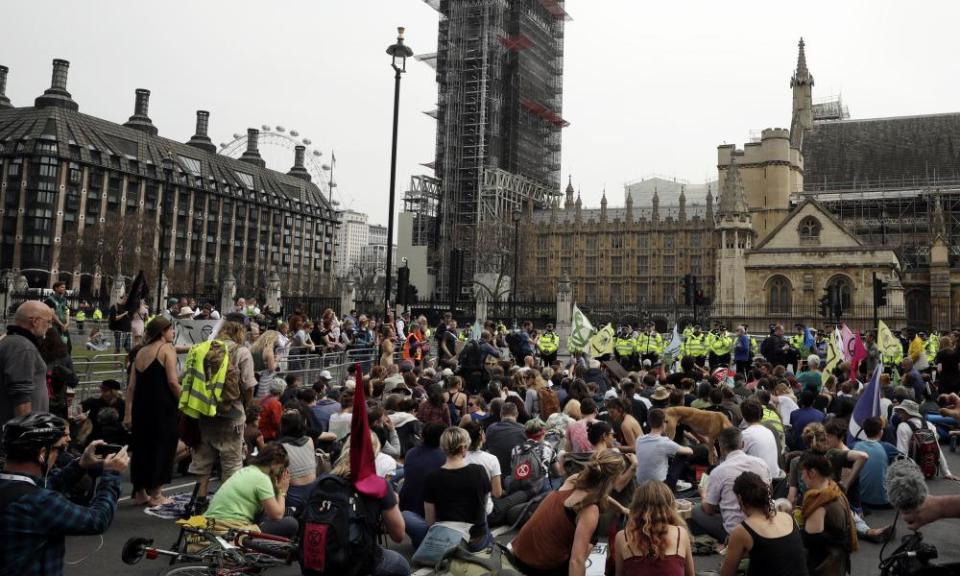Extinction Rebellion: police warn of Parliament Square arrests

Police have warned Extinction Rebellion organisers that they face arrest if they incite protesters to block roads around Parliament Square.
The Metropolitan police said it was imposing pre-emptive conditions restricting any demonstration outside the Houses of Parliament on Tuesday to the lawn in the centre of the square, after hearing that activists with the group planned to gather there.
Protesters must clear the area by midnight, police said, and may not gather in Old Palace Yard, a site the group has requested as a permanent protest camp.
Related: Extinction Rebellion protest day eight – in pictures
In Parliament Square on Tuesday morning, a small crowd of Extinction Rebellion protesters who had been there since Monday waited for the main protest march to arrive.
Amber, 23, who did not give her surname, said she was not hopeful the government would change its position on the climate emergency.
“We just want to be heard … we have put a lot into these occupations and actions, now we just need some sort of engagement from the government. They have been on holiday so who knows – they might come back and want to engage properly, but I’m not hopeful.”
Several hundred people arrived in Parliament Square just before midday on Tuesday, flags flying and drums beating. There was a big police presence as the protesters arrived in an attempt to prevent them blocking surrounding roads or Westminster Bridge.

Protesters sit in the road in Parliament Square.Photograph: Matt Dunham/AP
Clarissa Carlyon, from London, said: “We are coming into Parliament Square because we have captured the media’s attention and a lot of attention around the globe, and now it’s time for the politicians to come and talk to us.”
Liam Geary Baulch, 26, also from London, said relations between the group and the police had become increasingly strained, with dismay over the Met’s decision to name those charged in connection with the protest and to seize a soundsystem it had been using at its base at Marble Arch.
“We have seen thousands of people take non-violent action and over 1,000 arrests, yet we have had no complaints from the police about violence,” Geary Baulch said.
“What there has been complaints about is that despite the civil relations between the officers on the ground and the activists, there has been a lack of respect by them releasing the names and locations of more than 50 of the people charged, so I think there has been a breakdown of trust between the people on the ground and some of the officers because that’s making these people vulnerable to being doorstepped by the press.”
Activists were also surprised and dismayed by the police operation to seize their soundsystem on Monday night. “There were no liaison officers on shift, which I think was a big mistake, to do something that was going to make the crowd anxious,” Geary Baulch said, adding that the operation had also contributed to the breakdown of trust.
Four activists had secured themselves up tall trees at the back of Parliament Square where they had dropped banners saying “eyes on government in action” and “May profiting from war: citizens assembly now.”
Their friend, who was at the base of the trees, said they had climbed up in the early hours of the morning.
"I've got a steeplejack with me, we are rigging the rest of the trees into Systems. We are going to set up a traverse and hang more banners."
Dav, 40, from Bristol, who is up a tree in #parliamentsquare for #extinctionrebellion pic.twitter.com/CptSHK2DZQ— Damien Gayle (@damiengayle) April 23, 2019
More than 1,000 people have been arrested in the past week in a campaign of mass non-violent direct action orchestrated by the group to highlight how little time the world has left to halt manmade ecological breakdown.
Most have been arrested for breaching section 14 orders that restrict rights to protest in each location. But Tuesday’s order is the first to explicitly mention that organisers could be targeted for arrest.
A statement circulated to the media said: “Any organiser or person taking part in the protest failing to comply with these conditions or inciting others not to comply with them will be committing an offence and will be liable to arrest.”
Related: Battle of Waterloo Bridge: a week of Extinction Rebellion protests
Over the bank holiday weekend it took a mass police operation to clear Oxford Circus, Waterloo Bridge and Parliament Square of the small festivals of protest, which included stages, sound systems, workshops, wellbeing tents and free food.
Activists at each location had formed human barricades, securing themselves across roads and to key pieces of infrastructure using lock-on devices and superglue.

 Yahoo News
Yahoo News 
